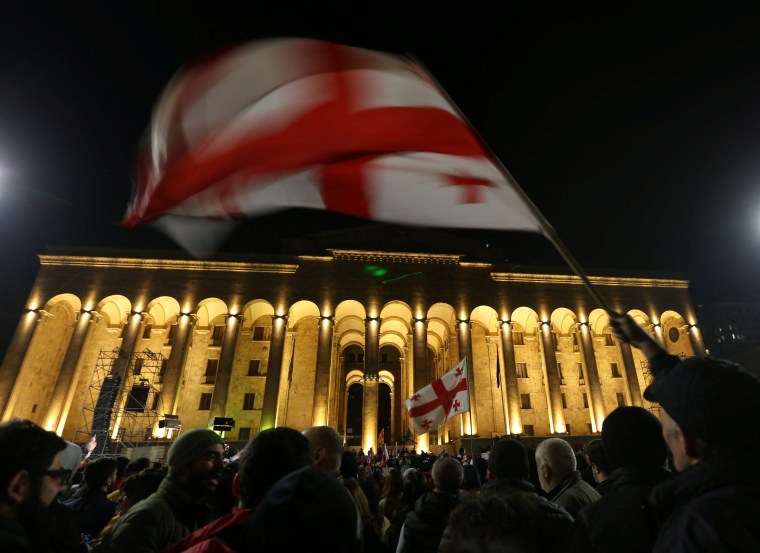Stockholm, April 14, 2023 – Georgia’s parliament should revoke its decision to suspend the accreditations of six journalists from critical news outlets and reform recently adopted accreditation regulations, the Committee to Protect Journalists said Friday.
Between April 3 and April 6, Georgia’s parliament suspended for one month the accreditations of three reporters and three camera operators from pro-opposition broadcasters Formula TV, Mtavari Arkhi, and TV Pirveli, citing new regulations prohibiting journalists from interviewing members of parliament without consent, according to news reports, copies of the journalists’ suspension notifications shared with CPJ or published on social media, and Mariam Gogosashvili, executive director of independent trade group Georgian Charter of Journalistic Ethics (GCJE), who spoke to CPJ by phone.
Three of the suspended journalists told CPJ by messaging app that they believed the real reason for their ban was that they asked parliamentary deputies inconvenient questions and said the regulations were used to silence critical media.
Speaker of Parliament Shalva Papuashvili rejected claims that the suspensions were related to the journalists’ critical questions, attributing the ban to their “harassment” of parliament members.
“Georgia’s parliament should withdraw the unwarranted accreditation suspensions of six pro-opposition journalists and rework its accreditation regulations, which appear all too open to abuse,” said Carlos Martínez de la Serna, CPJ’s program director, in New York. “If Georgian authorities are serious about reducing political and media polarization, they should work with all journalists to devise acceptable and sustainable regulatory frameworks.”
Parliament suspended the accreditation of Formula TV reporter Sofio Gozalishvili and camera operator Giga Agdgomelashvili, Mtavari Arkhi reporter Tatia Tsotsanava and camera operator Zuka Chkhvirkia, and TV Pirveli reporter Rusudan Dumbadze and camera operator Irakli Murmanshvili, according to news reports and Gogosashvili.
Gozalishvili, Tsotsanava, and Dumbadze told CPJ they denied acting inappropriately during their interviews. Dumbadze said ruling party parliament members routinely decline interviews with pro-opposition media, so impromptu interviews are often the only way to get comments, adding that the new regulations help the ruling party evade scrutiny from critical media.
Parliament’s accreditation regulations for journalists took effect on March 1 and require journalists to terminate interviews with parliamentary members, staff, or visitors if the latter refuse permission to record, according to a GCJE statement. They also allow parliament to deny access to accredited journalists on vague security grounds and introduce restrictions on journalists’ freedom of movement and right to film inside parliament.
Journalists can be suspended for a month for the first violation and six months for repeat offenses. Media outlets are limited on the number of accredited journalists they can have and are not allowed to replace suspended journalists.
Previously, there were no written regulations governing accreditation, which was provided as needed in the form of day passes rather than for a year as per the new regulations, Gogosashvili said.
Georgia’s Public Defender, a human rights ombudsman elected by parliament, and independent trade group Media Advocacy Coalition condemned the suspensions and called for reforming the new regulations.
Watchdogs have criticized the regulations for lacking an appeals process and for the broad discretion afforded to parliamentary authorities deciding on violations. Media advocacy groups are currently challenging the regulations in the courts, Gogosashvili said.
Previously, in March, parliament suspended the accreditation of Natia Amiranashvili, editor of the independent news website Publika, for one month, Gogosashvili said.
In December 2022, Georgia’s parliament passed amendments to the country’s broadcasting law that media advocates fear could be used to target pro-opposition TV channels. In March 2023, authorities were forced to shelve proposed bills that would have designated media outlets as foreign agents following widespread protests.
CPJ’s email to the Parliament of Georgia did not receive a reply.
